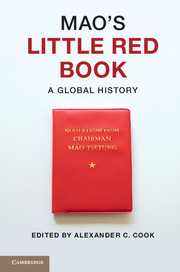Book contents
- Frontmatter
- Contents
- List of illustrations
- List of contributors
- Preface
- 1 Introduction
- 2 A single spark
- 3 Quotation songs
- 4 Mao quotations in factional battles and their afterlives
- 5 Translation and internationalism
- 6 Maoism in Tanzania
- 7 Empty symbol
- 8 The influence of Maoism in Peru
- 9 The book that bombed
- 10 Mao and the Albanians
- 11 Partisan legacies and anti-imperialist ambitions
- 12 Badge books and brand books
- 13 Principally contradiction
- 14 By the book
- 15 Conclusion
- Index
- References
12 - Badge books and brand books
The Mao Bible in East and West Germany
Published online by Cambridge University Press: 05 June 2014
- Frontmatter
- Contents
- List of illustrations
- List of contributors
- Preface
- 1 Introduction
- 2 A single spark
- 3 Quotation songs
- 4 Mao quotations in factional battles and their afterlives
- 5 Translation and internationalism
- 6 Maoism in Tanzania
- 7 Empty symbol
- 8 The influence of Maoism in Peru
- 9 The book that bombed
- 10 Mao and the Albanians
- 11 Partisan legacies and anti-imperialist ambitions
- 12 Badge books and brand books
- 13 Principally contradiction
- 14 By the book
- 15 Conclusion
- Index
- References
Summary
Some people have read a few Marxist books and think themselves quite learned but what they have read has not penetrated, has not struck root in their minds, so that they do not know how to use it and their class feelings remain as of old. Others are very conceited and having learned some book-phrases, think themselves terrific and are very cocky; but whenever a storm blows up, they take a stand very different from that of the workers and the majority of the peasants. They waver while the latter stand firm, they equivocate while the latter are forthright.
StudyWest Germans bought over one hundred thousand copies of Mao’s book of quotations in 1967. Three editions were sold, each bearing a distinct ideological imprint. Alongside the familiar, plastic-bound edition of the Beijing Foreign Languages Press was a paperback published by the left-liberal Fischer Press. Translated and edited by West German students of Sinology, the Fischer edition provided a scholarly perspective on the Cultural Revolution that was broadly sympathetic, signaling its orientation with a cover photograph of a young girl and an elderly woman in a benign moment of intergenerational communication. The third edition of Mao’s book of quotations, published by the anti-communist Marienburg Press, had the title The Mao Zedong Breviary: Catechism of 700 Million. The editor, Kurt C. Steinhaus, both tapped into and reinforced racialized anxiety in his introduction, warning of a “Far Eastern-Asiatic system endowed with an inborn collectivism striving uncompromisingly for world domination.” The publishers declared that their goal in releasing the book was to “show Mao in all his severity.” “It is necessary,” they said, “to give Germans and Europeans the creeps.”
- Type
- Chapter
- Information
- Mao's Little Red BookA Global History, pp. 206 - 224Publisher: Cambridge University PressPrint publication year: 2014
References
- 1
- Cited by

